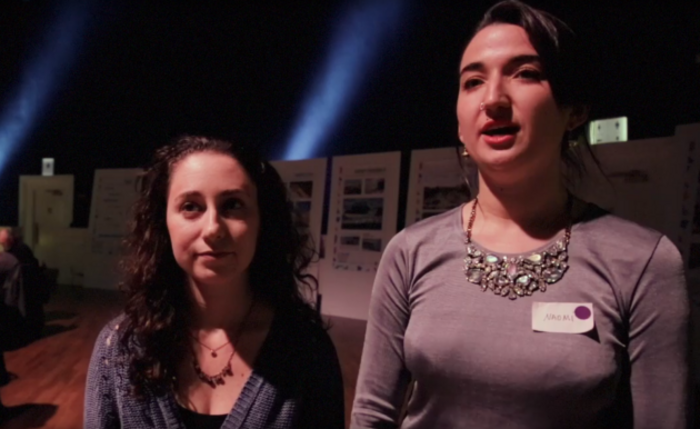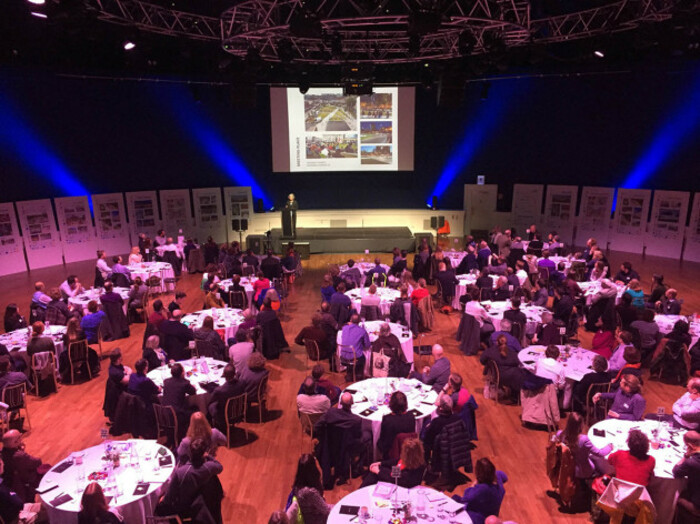'One mentor told me to bat my eyelashes and look pretty for investors and I'll be fine'
The founders of Connect the Dots talk about dealing with sexism while launching their tech startup.
AS FIRST-TIME FOUNDERS learning how to get a business off the ground, Naomi Murphy and Marisa Denker have been taking whatever advice they can get – but a recent mentoring session left them speechless.
Murphy and Denker run events company Connect the Dots, which they set up in 2014 after meeting on a masters programme at the Dublin Institute of Technology.
It started as a project to run niche events around the topic of vacant space in Dublin, but it has since evolved into a fledgling tech startup that develops software-as-service (SaaS) event planning tools.
As they developed their SaaS project, the pair toyed with the idea of looking for external investment for their company – leading Denker to a mentoring session to get advice from someone with experience in the area.
“He was kind of an older guy that I was paired with,” Denker told Fora. “The whole hour was mainly him talking about himself first of all and how great he has been and all the businesses he started.
“At that point, we were thinking of getting investment, so I was asking him for advice, how we would go about doing that and what would be your first steps.
“He said, ‘You’ll be fine, just get in a meeting with someone, bat your eyelashes and look pretty’. I didn’t know what to say at that moment.
“He was just not taking us seriously. It seemed like he didn’t even think investment was a thing in our future for him to give real advice on.”
Unprofessional
The experience appears to be far from an isolated incident among female founders in Ireland. Last year, Restored Hearing co-founder Rhona Togher told Fora that investors had told her up-front that they don’t invest in female-led companies.
A soon-to-be published survey of Irish female founders by TechIreland also appears to back up the comments.
This week, former Dublin startup commissioner Niamh Bushnell, who runs the TechIreland project, gave a preview of the results, saying that some female founders have told them they experienced “unprofessional behaviour” when pitching to male investors.
 Marisa Denker and Naomi Murphy (right)
Marisa Denker and Naomi Murphy (right)
Both Denker and Murphy said that the support structures are getting better for female entrepreneurs, but it’s the unconscious bias in the investor and tech communities that is tough to eradicate.
“I’ve friends who ask me if I encounter a lot of sexism and chauvinism while running a business,” Murphy said.
“I don’t know if it is that blatant for me all the time, I don’t have loads of those anecdotes – but that’s what scares me, that it’s happening subliminally. In a meeting they are smiling and nodding at you, but in their head they’ve shut you down.”
Denker adds that it is not only her and her co-founder’s gender that she believes stops them being taken seriously.
“Looking young and being young is a huge factor – I feel that more. I have meetings with older guys and they’re perfectly nice, but a lot of times they automatically take a mentorship approach to me.
“It’s nice in theory, but at the same time they would be automatically not putting me on their level.”
From project to tech startup
Despite some disheartening experiences, the Connect the Dots founders are broadly positive about the process they’ve been through in trying to turn the college project into a money-making enterprise.
They have built up a large portfolio of work with the business, helping to curate events for large organisations such as Accenture, Dublin City Council and Bank of Ireland.
“We helped them map out the attendees that should be there, how they should reach out to who should be there and send out all these attendees these specially designed survey,” said Denker.
“We give the attendees the chance to co-create the event and tell us all about themselves, where they were in their startup journey, are they nervous around networking or excited, what do they want to learn from the event. And we used that to design the event.”
Most recently, the startup has begun to diverge from solely event planning and has developed software tools to help other firms curate events.
Last year, Murphy and Denker’s startup successfully applied for the Ireland Funds’ business plan competition, run by NDRC, for help with the transition.
The programme helps startups tweak their concepts and pitches with the help of the accelerator’s advisers. Murphy said the past 12 months had effectively been a crash course in how to set up a tech business.
“I think it always helps to be tricked into it. You start doing it not realising fully what’s coming,” she said.
“We thought we were just doing this nice project that we enjoy doing. Then we saw it could be applied to something else.”
 A Connect the Dots event for Dublin City Council
A Connect the Dots event for Dublin City Council
Challenges
One of the biggest challenges so far, Murphy said, had been building the underpinnings of their platform as neither founder came from a tech background.
“We are trying to learn as we go and somehow try to make the best decisions. We have heard the horror stories of people losing so much funding with tech they build wrong,” she said.
As well as fine-tuning their technology, Denker said the company’s other main goal was to start generating sales for their new product.
“We want to have repeat clients, so (the business) will be more subscription-based in the future. At the moment it has been a lot of once-off events, but we’re trying to get repeat customers,” she said.
“We’re trying to be more proactive getting clients. We got so many clients from meeting people who came to our events, but we now have a sales list and a marketing strategy. It is all new to us, we’ve had to learn as we go.”
Connect the Dots was shortlisted for the Ireland Funds’ business plan competition, run by the NDRC, in 2017. Applications for this year’s competition are open until Wednesday, 25 April.






